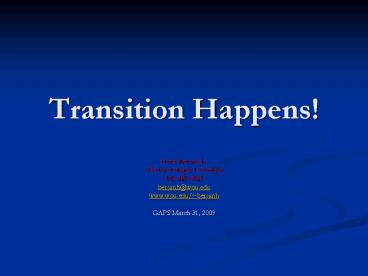Transition Happens - PowerPoint PPT Presentation
1 / 28
Title:
Transition Happens
Description:
(married, college, kicked out, jail, ran off with the circus... (married, college, kicked out, jail.... Most of us move out somewhere between age 16 and age 24. ... – PowerPoint PPT presentation
Number of Views:23
Avg rating:3.0/5.0
Title: Transition Happens
1
Transition Happens!
- Hank Bersani Jr.
- Western Oregon University
- 503-383-8687
- bersanh_at_wou.edu
- www.wou.edu/bersanh
- GAPS March 31, 2009
2
Three goals for my time
- 1) A shameless plug
- 2) A short exercise
- 3) Lessons Learned
3
Shameless plugWOU offers
- Graduate programs in Special Education and
Rehabilitation Counseling always seeking
qualified applicants - For high school graduates with a standard diploma
we have some of the best supports for students
with disabilities in the state public or
private.
4
A short exercise
- Totally voluntary
- You dont have to disclose anything too personal,
but play along as much as you are comfortable.
5
How old were you when you first earned money for
work, and how much were you paid?
6
What was your first job, and do you still do that
work today?
7
How did you get that first job?
8
From that first job, do you still use any of the
skills you learned on that job?
9
How old were you when you left home?
- (married, college, kicked out, jail, ran off
with the circus.)
10
At what age did you start learning how to drive?
11
Between the ages of 14 and 24, did you
- crash a car, get picked up by the police, go into
debt, buy something you could not afford, flunk
out of school, get fired, hang out with the wrong
crowd.
12
Yet, you are all here tonight
- Transition happens!
13
Lessons Learned
14
How old were you when you first earned money for
work, and how much were you paid?
15
Paid work is a formative experience your work
experience is part of who you are today
16
What was your first job, and do you still do that
work today?
17
Your first job was just that, your FIRST job.
You learned a lot since then and have moved on.
18
How did you get that first job?
- Many jobs (most first jobs) come from the
informal employment network.
19
From that first job, do you still use any of the
skills you learned on that job?
20
Job specific skills may not carry over, but the
basics of being a good employee do. They are
useful in future jobs
21
How old were you when you left home? (married,
college, kicked out, jail.
22
Most of us move out somewhere between age 16 and
age 24.
- Not everyone, not everywhere!
23
At what age did you start learning how to drive?
24
You begin learning adult skills even as a 2-3
year old it is a 20 year process that cant
wait until you are 21.
25
Between the ages of 14 and 24, did youcrash a
car, get picked up by the police, go into debt,
buy something you could not afford, flunk out of
school, get fired, hang out with the wrong crowd.
26
Even bad experiences have their value. We learn
from our troubles at least as much as from our
successes
27
Transition Happens
- Transition from high school is difficult for
everyone. - It is even more difficult for students with
disabilities. - So its all the more important that it be a well
planned, coordinated set of activities that
include transition into all of the domains of
adult life employment, housing, friends,
continuing education, recreation, interpersonal
relationships, etc . - Planning needs to begin early not at age 20,
not at age 16.
28
Transition Planning
- Not just a good idea, its the law































